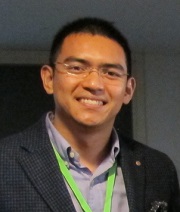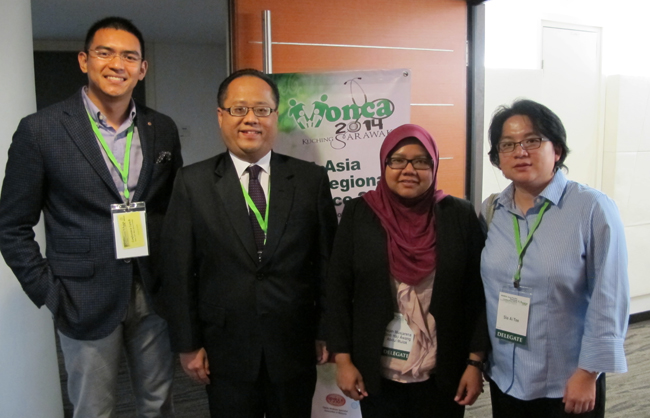METASSAN, Dr Munir
Brunei Darussalam - GP registrar
 What work do you do now?
What work do you do now?
My name is Munir Metassan and I’m currently a GP registrar working in Sungai Assam clinic in Brunei Darussalam.
Sungai Assam is an underprivileged area of Brunei and has a catchment area of 22,000 people living in and around the historic Water Village (Kampung Ayer) despite its close proximity to the capital city. Coherent with Brunei’s aim of providing accessible healthcare to all Bruneians this clinic was built in 1997 to accommodate these people who otherwise will need to get a boat ride to the mainland for basic medical care.
Interestingly so, there is stark contrast of attitudes towards health, expectations and general health literacy in the area largely related to their lower socioeconomic status. Hence working here provides unique challenges in areas such as communication, empowerment, management of chronic diseases and finally education.
In addition to my clinic work, I am also a volunteer doctor for Brunei Special Olympics athletes and recently travelled with the team to Newcastle, Australia for the Asia Pacific Special Olympic Games. There I was exposed to the “Healthy Athletes Program” which is a basic screening program for athletes which included oral care, sight and hearing. I was shocked to find out that many of our athletes had very poor oral care and some had hearing difficulties and refraction problems. Despite having a virtually free and accessible healthcare in Brunei, people with intellectual disabilities are still an under-served population.
Much work still needs to be done to reach out to them and their parents need to be educated as they may not realize their children needs medical attention. Currently we are trying to set up a similar health screening program targeted for people with intellectual disabilities in the Bruneian community.
What other interesting activities that you have been involved in?
Primary Health Care is still a young department in Brunei and constantly evolving. As a GP joining from Internal Medicine I have realized the impact primary care physicians and how crucial their role is with regards to holistic management of a patient and as an individual.

In the recent WONCA 2014 held in Kuching I took the opportunity to learn more about the Primary Health Care set-up from our neighbouring countries. Listening to their struggles now and many years ago parallels with many difficulties we currently face in Brunei.
photo: In Kuching, Munir (left) with other Brunei colleagues (from left to right): - Dr Azlan Jeludin (previous Head of Primary Healthcare), Dr Musjarina Mulok (Senior Medical Officer) and Dr Sia Ai Ting (Senior Medical Officer).
As a young doctor, I am also given the opportunity to participate in a Taskforce to improve the welfare of our Primary Healthcare doctors, implement changes to upgrade Primary Healthcare services and maximize our available resources to achieve the highest quality of service and patient management.
What are your interests as a GP and also outside work?
Professionally my interest lies in diabetes management. Diabetes is vastly an increasing problem in Brunei with significant impact on morbidity and mortality. Much stems from our sedentary lifestyle and attitudes towards healthy lifestyle choices. My approach to patients has very much changed from my time working in Hospital. I had to learn to be less technical and more engaging with my patients.
Sometimes the key to successful management with diabetes is not about utilising the latest medication but understanding the family dynamics and setting up realistic goals of each individual patient. I also found that working as a GP in Brunei requires very specific communication skills which are very different from those taught in Western medical schools. The concept of autonomy is almost alien, where patient rely heavily on other family members (especially elders) to decide on treatment options or undergo investigation. Hence engraining the concept of disease ownership and empowerment is a unique challenge but a very interesting one indeed!
Outside work my interest is mainly sports especially Basketball and Futsal (Five-a-side indoor soccer). It serves as an avenue to relax and unwind from the daily rigours of my work as well as maintaining both physical and mental health. I am also a licensed scuba diver and recently went to Cebu to dive with the ever-graceful whale sharks!
But my passion is actually menswear - anything from hand rolled seven-fold silk ties to Goodyear welted shoes and everything in between! I’m very much intrigued by the traditional values of menswear, its construction and the quality of materials. Unfortunately these ideals have all been side-lined in place of marketing, easy profits and mass production. I see similar values diminishing in medicine where the idea of a family doctor is replaced by a one-dimensional figure such as “gate-keepers” in a world where treatment “targets” are generalised, medical treatment being compartmentalised to primary, secondary and tertiary care and where specialities are becoming sub- and super- specialities.
What is it like to be a family doctor in Brunei?
The current primary healthcare set-up is mainly government-run GP practices (clinics). Private GPs make up less than 20 percent. Government clinics are set-up in predetermined localities to cover a certain catchment area. The size of each clinic and number of doctors working are determined by the population number of those areas. Doctors need not be from the same locality as Brunei is so small and otherwise very easy to travel.
Over 95% of chronic disease seen in the community will be by government-run clinics and because of the virtually free healthcare in Brunei (patients pay only BND $1 : USD $0.80 for anything from six months’ supply of anti-hypertensive medication to open heart surgery in a government tertiary centre), the burden both on manpower and the economy are explicably huge. This has undesirably led to very poor utilization and misuse of resources.
Government GPs are also responsible for many other non-GP related works such as medical cover for public gatherings, sports events, and international conferences and other occasions where a doctor’s present is deemed necessary. In addition, we have weekly rotation of out-of hours GP service and also carry out School Health screening which is a general health screening for all school children at certain time intervals.
With many responsibilities outside our core job, many government GPs have left to join the increasingly appealing private workforce. This has led to recent shortages of manpower which has triggered the formation of a Taskforce to probe into this multi-dimensional issue. Additionally, the ministry are taking the necessary steps to alleviate the burden on government GPs including piloting nurse practitioners for minor illnesses, negotiating Government to move towards self-certification for sick leave, and taking advantage of this new redistribution of doctors by providing incentives both for patients to see private GPs and private GPs to manage patients with chronic diseases.